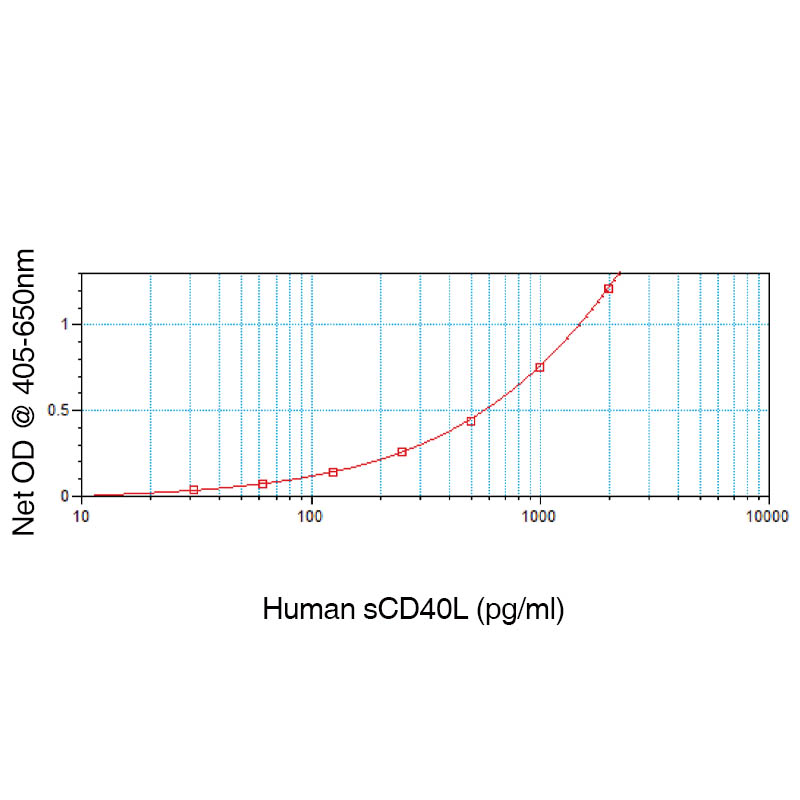Human CD154 (CD40 Ligand) ELISA Development Kit
Product Code:
LEI-C1586
LEI-C1586
Host Type:
Human
Human
Regulatory Status:
RUO
RUO
Application:
Enzyme-Linked Immunosorbent Assay (ELISA)
Enzyme-Linked Immunosorbent Assay (ELISA)
No additional charges, what you see is what you pay! *
| Code | Size | Price |
|---|
| LEI-C1586-15plates | 15 plates | £1,069.00 |
Quantity:
Prices exclude any Taxes / VAT
Stay in control of your spending. These prices have no additional charges, not even shipping!
* Rare exceptions are clearly labelled (only 0.14% of items!).
* Rare exceptions are clearly labelled (only 0.14% of items!).
Multibuy discounts available! Contact us to find what you can save.
This product comes from: US.
Typical lead time: 14-21 working days.
Contact us for more accurate information.
Typical lead time: 14-21 working days.
Contact us for more accurate information.
- Further Information
- Related Products
- Show All
Further Information
Long Description:
CD40 is a 48 kD type I transmembrane glycoprotein that is a member of the TNFR superfamily. CD40, in association with its ligand CD154 (CD40L) - a 39 kD protein, acts as a costimulatory molecule for the activation of B cells, dendritic cells, monocytes, and other antigen presenting cells. CD40 is involved in Ig isotype switching and dendritic cell maturation, as well as the activation, differentiation and proliferation of B cells. CD40 interacts with TNFR2 and is involved in the regulation of signal transduction. CD40 is a potential target for cancer immunotherapy. Blocking the interaction of CD40 with its ligand (CD154) is the sought-after therapeutic objective for preventing and/or improving both autoimmune diseases and transplant rejection. Studies have shown that monoclonal antibodies that block CD154 in human clinical trials resulted in unanticipated vascular complications. Hence, an interest in the therapeutic potential for antagonist mAbs specific for human CD40 is emerging. Antibodies of particular therapeutic interest are those that do not inhibit CD40 signaling via physical competition with CD154. Additionally, the interaction of CD40 and its ligand (CD154) is found to be essential for amyloid-beta-induced microglial activation, thus plays a significant part in Alzheimer disease pathogenesis.
Target:
CD154
Related Products
| Product Name | Product Code | Supplier | Anti-Human CD40 Ligand (CD40L) - Biotin | LEI-C1166 | Leinco Technologies | Summary Details | |||||||||||||||||||||||||||||||||||||||||||||||||||||||||||||||||||||||||||||||||||||||||||||
|---|---|---|---|---|---|---|---|---|---|---|---|---|---|---|---|---|---|---|---|---|---|---|---|---|---|---|---|---|---|---|---|---|---|---|---|---|---|---|---|---|---|---|---|---|---|---|---|---|---|---|---|---|---|---|---|---|---|---|---|---|---|---|---|---|---|---|---|---|---|---|---|---|---|---|---|---|---|---|---|---|---|---|---|---|---|---|---|---|---|---|---|---|---|---|---|---|---|---|---|
| Recombinant Mouse CD40 | LEI-C1336 | Leinco Technologies | Summary Details | ||||||||||||||||||||||||||||||||||||||||||||||||||||||||||||||||||||||||||||||||||||||||||||||||
| Recombinant Human CD40 Ligand (aa 108-261) | LEI-C1346 | Leinco Technologies | Summary Details | ||||||||||||||||||||||||||||||||||||||||||||||||||||||||||||||||||||||||||||||||||||||||||||||||
| Anti-Mouse CD40 | LEI-C1383 | Leinco Technologies | Summary Details | ||||||||||||||||||||||||||||||||||||||||||||||||||||||||||||||||||||||||||||||||||||||||||||||||
| Anti-Mouse CD40 (Clone 65924) | LEI-C1417 | Leinco Technologies | Summary Details | ||||||||||||||||||||||||||||||||||||||||||||||||||||||||||||||||||||||||||||||||||||||||||||||||
| Anti-Mouse CD154 (CD40L) - Biotin | LEI-C1499 | Leinco Technologies | Summary Details | ||||||||||||||||||||||||||||||||||||||||||||||||||||||||||||||||||||||||||||||||||||||||||||||||
| Anti-Mouse CD154 - Biotin | LEI-C2349 | Leinco Technologies | Summary Details | ||||||||||||||||||||||||||||||||||||||||||||||||||||||||||||||||||||||||||||||||||||||||||||||||
| Anti-Mouse CD154 - APC | LEI-C2350 | Leinco Technologies | Summary Details | ||||||||||||||||||||||||||||||||||||||||||||||||||||||||||||||||||||||||||||||||||||||||||||||||
| Anti-Mouse CD154 - PE | LEI-C2351 | Leinco Technologies | Summary Details | ||||||||||||||||||||||||||||||||||||||||||||||||||||||||||||||||||||||||||||||||||||||||||||||||
| Recombinant Human CD40 Ligand (soluble) | LEI-C386 | Leinco Technologies | Summary Details | ||||||||||||||||||||||||||||||||||||||||||||||||||||||||||||||||||||||||||||||||||||||||||||||||
| Anti-Human CD40 Ligand | LEI-C845 | Leinco Technologies | Summary Details | ||||||||||||||||||||||||||||||||||||||||||||||||||||||||||||||||||||||||||||||||||||||||||||||||



